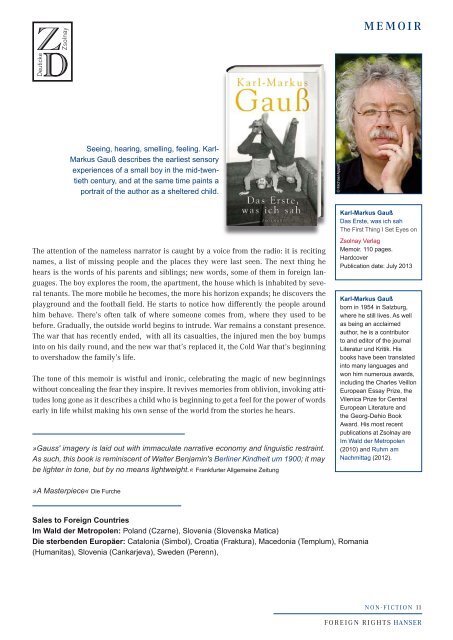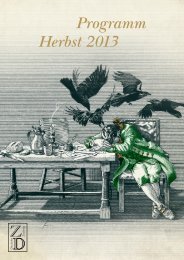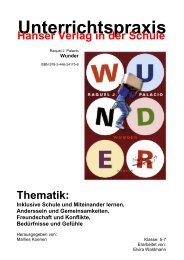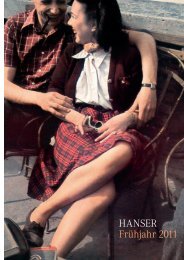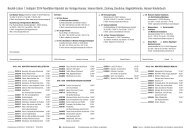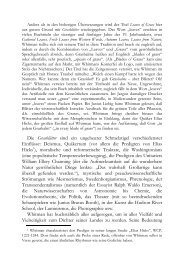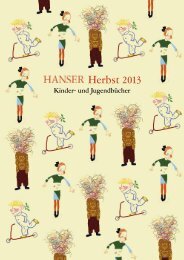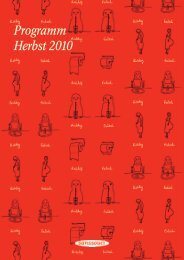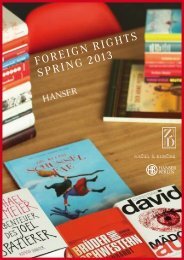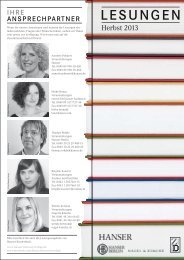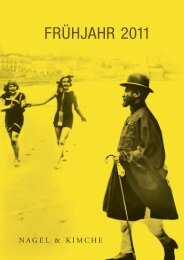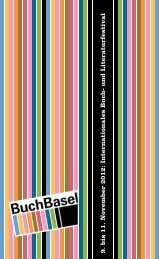FOREIGN RIGHTS AUTUMN 2013 - Hanser Literaturverlage
FOREIGN RIGHTS AUTUMN 2013 - Hanser Literaturverlage
FOREIGN RIGHTS AUTUMN 2013 - Hanser Literaturverlage
You also want an ePaper? Increase the reach of your titles
YUMPU automatically turns print PDFs into web optimized ePapers that Google loves.
M E M O I R<br />
Seeing, hearing, smelling, feeling. Karl-<br />
Markus Gauß describes the earliest sensory<br />
experiences of a small boy in the mid-twentieth<br />
century, and at the same time paints a<br />
portrait of the author as a sheltered child.<br />
© Michael Appelt<br />
Karl-Markus Gauß<br />
Das Erste, was ich sah<br />
The First Thing I Set Eyes on<br />
The attention of the nameless narrator is caught by a voice from the radio: it is reciting<br />
names, a list of missing people and the places they were last seen. The next thing he<br />
hears is the words of his parents and siblings; new words, some of them in foreign languages.<br />
The boy explores the room, the apartment, the house which is inhabited by several<br />
tenants. The more mobile he becomes, the more his horizon expands; he discovers the<br />
playground and the football field. He starts to notice how differently the people around<br />
him behave. There’s often talk of where someone comes from, where they used to be<br />
before. Gradually, the outside world begins to intrude. War remains a constant presence.<br />
The war that has recently ended, with all its casualties, the injured men the boy bumps<br />
into on his daily round, and the new war that’s replaced it, the Cold War that’s beginning<br />
to overshadow the family’s life.<br />
The tone of this memoir is wistful and ironic, celebrating the magic of new beginnings<br />
without concealing the fear they inspire. It revives memories from oblivion, invoking attitudes<br />
long gone as it describes a child who is beginning to get a feel for the power of words<br />
early in life whilst making his own sense of the world from the stories he hears.<br />
»Gauss' imagery is laid out with immaculate narrative economy and linguistic restraint.<br />
As such, this book is reminiscent of Walter Benjamin's Berliner Kindheit um 1900; it may<br />
be lighter in tone, but by no means lightweight.« Frankfurter Allgemeine Zeitung<br />
Zsolnay Verlag<br />
Memoir. 110 pages.<br />
Hardcover<br />
Publication date: July <strong>2013</strong><br />
Karl-Markus Gauß<br />
born in 1954 in Salzburg,<br />
where he still lives. As well<br />
as being an acclaimed<br />
author, he is a contributor<br />
to and editor of the journal<br />
Literatur und Kritik. His<br />
books have been translated<br />
into many languages and<br />
won him numerous awards,<br />
including the Charles Veillon<br />
European Essay Prize, the<br />
Vilenica Prize for Central<br />
European Literature and<br />
the Georg-Dehio Book<br />
Award. His most recent<br />
publications at Zsolnay are<br />
Im Wald der Metropolen<br />
(2010) and Ruhm am<br />
Nachmittag (2012).<br />
»A Masterpiece« Die Furche<br />
Sales to Foreign Countries<br />
Im Wald der Metropolen: Poland (Czarne), Slovenia (Slovenska Matica)<br />
Die sterbenden Europäer: Catalonia (Simbol), Croatia (Fraktura), Macedonia (Templum), Romania<br />
(Humanitas), Slovenia (Cankarjeva), Sweden (Perenn),<br />
N O N - F I C T I O N 11<br />
F O R E I G N R I G H T S HANSER


